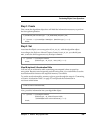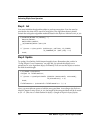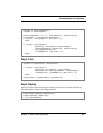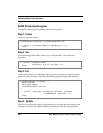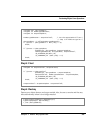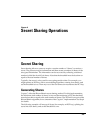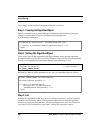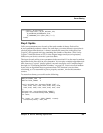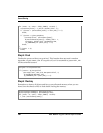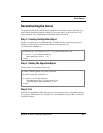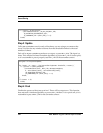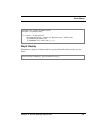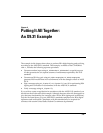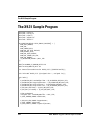
Chapter 8 Secret Sharing Operations 307
Secret Sharing
Step 4: Update
Call B_EncryptUpdate once for each of the total number of shares. Each call to
B_EncryptUpdate produces a share. For each share, you must allocate a space that is
one byte larger than the secret. A share is actually the same size as the secret, but
Crypto-C also appends one byte containing the number of the share. (This is why
Crypto-C limits the shares to 255; it is the largest integer one byte can represent.)
Make sure you do not overwrite a previous share.
The input for each call to
B_EncryptUpdate is the secret itself. You also need a random
algorithm for the first call to
B_EncryptUpdate. You can pass a random algorithm each
time, however; Crypto-C simply ignores it on each successive call. Complete Steps 1
through 4 of “Generating Random Numbers” on page 165. You do not need random
bytes, only an algorithm that can generate them. This function is not too time-
consuming, so it is reasonable to pass a properly cast
NULL_PTR for the surrender
context.
To create four shares, you could use the following:
if ((status = B_EncryptInit
(secretSplitter, (B_KEY_OBJ)NULL_PTR,
(B_ALGORITHM_CHOOSER)NULL_PTR,
(A_SURRENDER_CTX *)NULL_PTR)) != 0)
break;
#define SECRET_SIZE 16
#define TOTAL_SHARES 4
static unsigned char secretKey[SECRET_SIZE] = {
0x01, 0x02, 0x03, 0x04, 0x05, 0x06, 0x07, 0x08,
0x09, 0x0a, 0x0b, 0x0c, 0x0d, 0x0e, 0x0f, 0x10
};
unsigned char *secretShare[TOTAL_SHARES];
unsigned int secretShareLen[TOTAL_SHARES];
int count;
for (count = 0; count < TOTAL_SHARES; ++count)
secretShare[count] = NULL_PTR;



